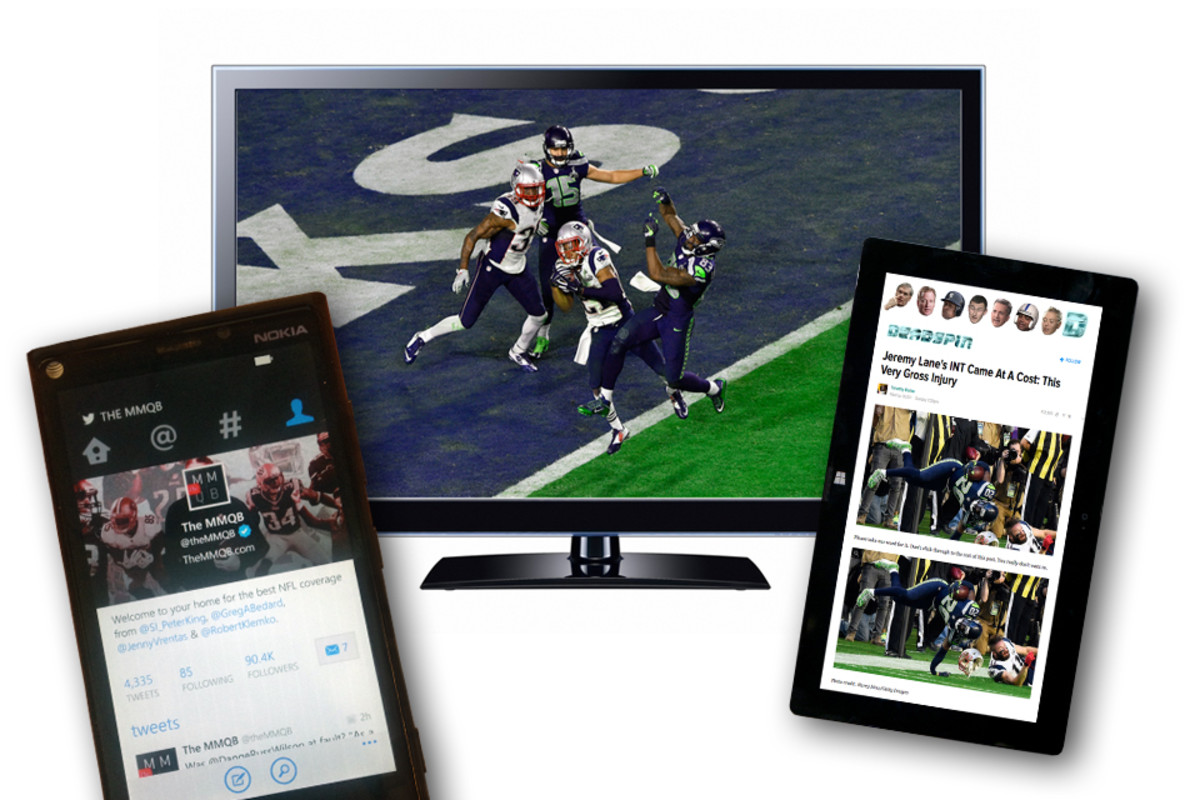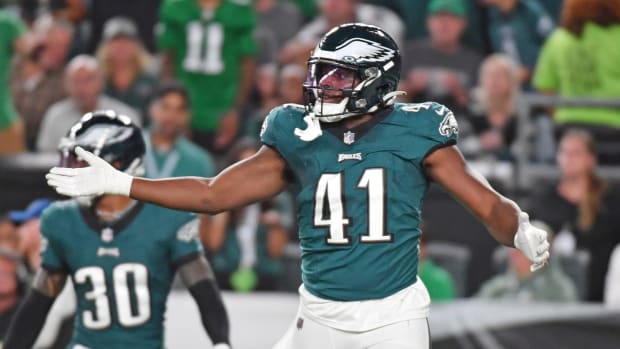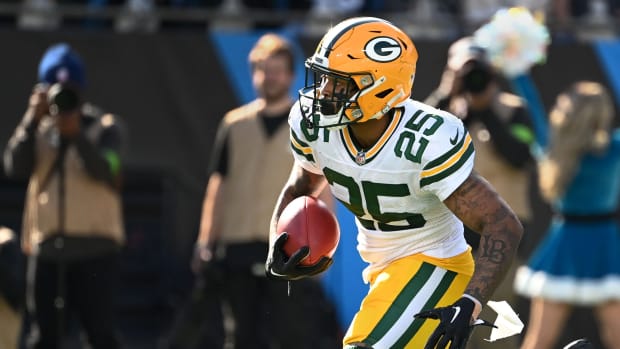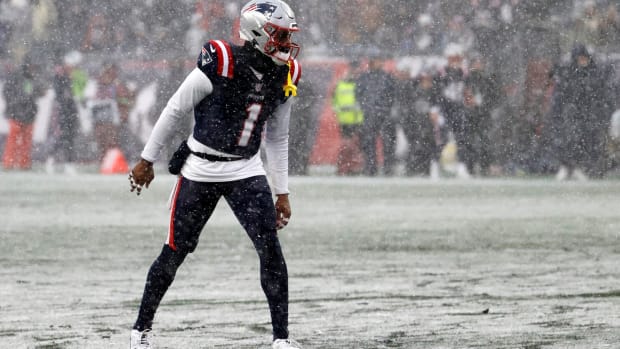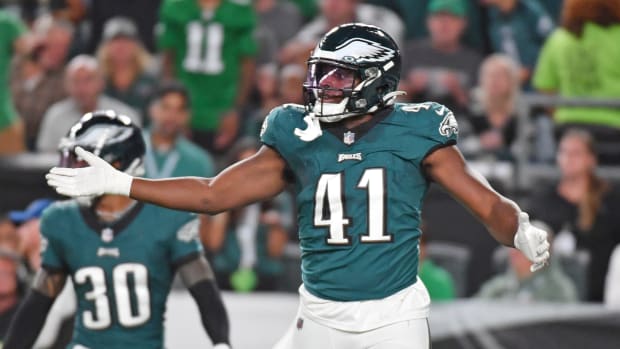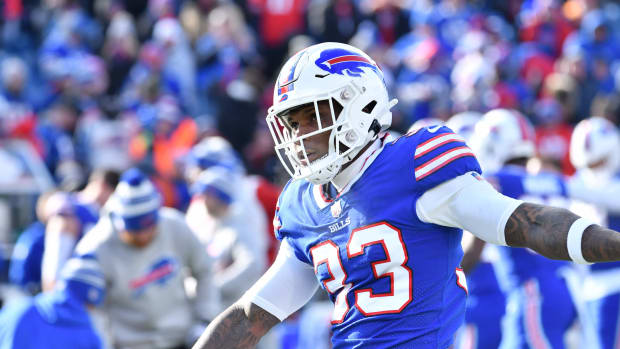‘It’s Like One Huge Bar Conversation’
I’m perpetually curious about how future generations will watch football, and with that in mind, I paneled a group of college students in October 2013 to discuss the differences between how they and their parents view the NFL, as well as the impact of Twitter on football Sundays and which broadcast personalities resonate with them the most.
I thought it would be interesting to check in with the students again—college newspaper editors and writers from around the country—and ask a series of questions about how they consumed the Patriots’ win over the Seahawks in Super Bowl 49, and what stories they think NFL media should pursue going forward.
The panelists:
Max Cohen, junior, University of Michigan
Cody Goodwin, senior, University of Iowa
Sarah Kirkpatrick, junior, Boston University
Beth Maiman, senior, University of Oregon
Aron Yohannes, senior, University of Wisconsin-Parkside
Outside of being asked to keep the answers tight, the student journalists weren’t given any requirements or restrictions. And they were free to skip questions.
What do you consider your first screen for the NFL and why?
Cohen: I’ll go with my computer screen. Even though when I watch games I focus on my television, I think I spend the majority of my time following the NFL by reading stories from various news outlets on my computer throughout the season.
Goodwin: It depends for me. If the Chiefs are the national game, absolutely the television. They’re my team, and I have to watch them when I can, which isn’t often when I’m in Iowa. Otherwise, I’d have to say my iPhone, primarily because of Twitter and the Yahoo! Sports App. Twitter gives me the commentary and interesting facts and tidbits—seriously, it’s like one huge bar conversation during the right sporting event, which is both crazy awesome and crazy weird. The Yahoo! Sports App gives me in-game stats and other stuff I want to know. It’s a nice balance. (For the record: I’ll still use my iPhone when I watch the Chiefs game.)
Kirkpatrick: I'm usually busy on Sundays so I don't watch football as much as I used to, but when I do, I'll have a game on my TV while I do other work on my computer.
Maiman: I will always consider my first screen for the NFL to be my television. I think it’s just the best way to watch the game, especially if I am tuning in as a fan. However, circumstances caused me to be traveling in the car during the NFC Championship Game. But thanks to Twitter, I was able to follow it while sitting in the passenger seat. That was one moment where I was specifically grateful that sports journalists use social media while reporting on games. Although, it took away my Dad’s excitement when he kept calling me with updates about what was happening. Sorry, Pops.
Yohannes: The television screen—not my computer, tablet or phone one. One of the most important things I learned this past season covering the Packers for SB Nation is that you learn everything about this game on the field by really paying attention. I think with the impact social media has on games, some people glance at their Twitter timeline for too long and miss important notes on the field. I’ve started to tweet less and less during games, and that’s a good thing because I’m examining what’s going on and rarely looking at other distractions.
As college journalists, how do you view Marshawn Lynch’s answers and non-answers with the media?
Cohen: I’m sure I’d feel differently if I covered the Seahawks on a regular basis, but I don’t necessarily understand all of the hoopla. I read numerous great stories this week that didn’t need Lynch quotes at all. There were 105 other players on Super Bowl rosters and dozens of coaches to talk to. I like to think if I were covering the Super Bowl, I wouldn’t feel the need to just rely on Lynch’s quotes. Lots of journalists found other ways to write great stories this week, even ones that were still about Lynch, and I think it’s a shame that they were overshadowed by other journalists who were upset about Lynch’s non-answers. I think I’d rather be fined than listen to typical quotes about execution anyway.
A Marshawn Kind of Way
Goodwin: Personally, I think they’re funny. As long as an athlete produces on the field, and there’s no question Beast Mode does, they should be allowed to say what they want. It’d be different if he wasn’t any good and carried a similar attitude. At the same time, you have to think the media knows by now to avoid him if that’s what he’s going to do. His reactions and responses aren’t anything new, so go talk to someone else. I’m sure I speak for everybody else on the panel when I say we’ve all—at one point or another—run into someone who just doesn’t give good quotes. You learn to work around it, even if that person’s performance is a major part of any given story. Champions adjust.
Kirkpatrick: I look at this with a couple different perspectives. From a business perspective, Lynch is doing websites a favor—his non-answers and answers are comical and entertaining to most, and articles about that will garner significantly more page views and clicks than a normal article with the usual, standard, dry-toast quotes you get from players. From the perspective of a young journalist who has yet to master the art of interviewing, it makes me focus just that much more on the wording and substance of what I’m asking. Lynch is a smart man, and is tired of the usual nonsense. He’s not going to try if we aren’t.
Maiman: If my assignment is to write an in-depth and interesting profile on Marshawn Lynch, I am annoyed and frustrated. But also, maybe I am up for the challenge of earning his trust to talk to me. (Although that appears to be an extremely difficult task.) If getting a quote from him isn't dire for me to do my job, I am going nowhere near his table. I think it would be a great social experiment if he just sat there and no one from the media asked him questions or gave him attention. I’m curious if that would spark some sudden urge to talk. Maybe not? But it’s worth the shot and would be interesting to see.
Yohannes: Some athletes just don’t want to talk, so I let them be and move on. The best relationships are built with players without the recorder in hand, and you can still write a great story even when someone doesn’t give you an answer. It was all funny to me. Besides, when you just look at the questions he was asked, the media wasn’t genuinely concerned about Lynch’s answers. A lot of people were just asking him questions for the sound bites and that’s it.
Where did you watch the Super Bowl? Be as specific as you can, including the place you watched, the number of people you watched with, and why you chose that location?
Cohen: I watched the Super Bowl in the newsroom of The Michigan Daily. As one of the Daily’s sports editors, we spent Super Bowl Sunday putting together Monday’s edition of the paper. The entire production staff was present, even though every section but sports cared more about the halftime show than the game itself. I think everyone was more excited about the Sunday night announcement that Michigan had cancelled Monday’s classes for the school’s second weather-related closure since the 1970s than Malcolm Butler’s interception.
Goodwin: I was at home in Kansas City. My nephews had their first birthday the day before, so I stuck around and enjoyed the big game with my family. There were 13 of us in all, and we just sat around the living room. My dad and brother-in-law pulled for the Seahawks while I rooted for the Patriots. This was actually an abnormal decision for me because I’ve been at school for the last few Super Bowls. Before college, the Super Bowl was like a family event for us. We’d always sit around and hope for a good game, but also critique the commercials. There’s always something for everybody. (It helps, too, that my mom made her “Super Bowl Sundaes.” Don’t believe me? Check my sister’s Instagram. It was delish.)
Kirkpatrick: I hosted a small Super Bowl party at my apartment and had five friends over. It was an equal split of Seahawks fans (including me), Patriots fans and people who were indifferent. As a Seahawks fan studying and living in Boston, the total of Pats fans probably would have been too lopsided against me had I invited too many more people.
Maiman: I recently moved to Atlanta for an internship and don’t know that many people here yet. I was invited by my friend from high school who goes to Georgia Tech to go watch the game at her aunt’s house in the suburbs. We watched in their living room with their family; there were six of us all together. My friend and her aunt are originally from the Boston area, so they obviously were invested. It was really nice meeting them, chatting about sports and trying Zaxby’s chicken for the first time. Our other option was to go to a frat party on campus, but spending time with a family just seemed more suitable for the type of experience we were looking for. I am a little homesick here and it was nice to be in that type of environment. Growing up, the Super Bowl was always a family experience for me, so it was nice to spend it in a home—so shout out to Skip and Anne for the southern hospitality.
Yohannes: I was kind of stuck having to make due at my parents’ house because we unfortunately had close to nine inches of snow here in Wisconsin. Per usual, we kept it simple by just making pizza and eating more unhealthy stuff. I watched Super Bowls with them all the time when I was a child and even now, at 21, I still enjoy watching sporting events with them because they constantly bicker about which team is better, along with the penalties. Without the weather being the way it was, I planned on meeting with four of my friends at a sports pub on the east side of Milwaukee. We’ve always done small hangouts in social settings whenever the game is played each year because of the atmosphere. The Super Bowl is also one of the last times we get to all meet up and relax before our spring semesters get rolling.
Detail all the devices that were part of your Super Bowl-watching experience (mobile, computer, television) and what you used them for specifically?
Cohen: I watched the game on television and had my computer handy both to edit stories for the paper and for the occasional Twitter update.
Goodwin: We watched the game on a massive, beautiful 60-inch television in the living room, but I also had my phone in my hand the entire time with Twitter open. I mainly used that to check for game updates that Al Michaels and Cris Collinsworth didn’t know about. Prime example: Jeremy Lane’s injury. Dad and I didn’t know how serious it was at first, but then I came across that picture (through Deadspin, if I remember correctly). That was initially gross, but we wouldn’t have known how bad it was without Twitter. Also: the tweets during Katy Perry’s halftime performance were wildly entertaining. If somebody comes across one of those shark costumes, give me a holler. Please. Like, I’m serious.
Like Father, Like Son
Kirkpatrick:
We kept it simple: One TV for watching the game broadcast, and those of us who are bigger sports fans followed updates on Twitter through our phones.
Maiman: Most of my focus was on the television and since I was with people I just met, I was trying to not be the typical obnoxious millennial who is always on their phone. (Yes, I took one for the team; you’re welcome Generation Y.) However, I couldn’t spare to not check Twitter at certain moments, specifically when an injury happened. Since Jeremy Lane’s injury was gruesome, I didn’t catch a replay and found myself wanting to know more about what happened. I was occasionally interested in checking Twitter when the game wasn’t going on. I looked to see what people were saying about the commercials and the halftime performance. That usually isn’t the case when I am watching the NFL, but since this Super Bowl was close and exciting throughout, it kept my attention.
Yohannes: The only devices used during the game were my iPhone and iPad mini for social media, and then our Sony 32-inch television that we watched the game on (the quality is always fantastic). Social media is basically one big watch party.
Which NFL journalist do you trust the most and why?
Cohen: Nationally, I have to go with Michigan Daily alum Adam Schefter. Since I’m from the Philadelphia area and worked with them last summer, I regularly read and trust Jeff McLane and Zach Berman from The Philadelphia Inquirer. There’s a certain trust I have in newspaper reporting credibility that I think too many people lose sight of in the age of always trying to get the first scoop.
Goodwin: I’m split. I like both Jason La Canfora and Adam Schefter. They’re both personable and churn out good stuff seemingly every day. Whenever I want to know something, anything NFL-related, I skim their Twitter feeds and I’ll find it. It’s virtually a guarantee. I also like the Kansas City Star’s Terez Paylor. He’s a football nerd if there ever were such a thing, and it’s been a blessing to read his Chiefs stuff the last couple of years
Kirkpatrick: On a national basis, Ian Rapoport. He isn't really biased toward any team and keeps it simple, but still has a good personality.
Maiman: Adam Schefter. He is often reporting breaking news first or following up with new information. I respect journalists who get the facts not only right, but quickly. I gained even more respect for him after reading this feature in The Washington Post.
Yohannes: For news, it’s Jay Glazer. Jay’s always been accurate with scoops and even breaks information out pretty early (see Jim Harbaugh not returning to San Francisco). You can’t go wrong with Adam Schefter or Ian Rapoport, either. All of those guys are trustworthy, work hard and deserve credit, along with many others. On a personal level of trust for me, it’s Master Tesfatsion of the Minneapolis Star Tribune, who covers the Minnesota Vikings. He reached out to me a year ago around this time via email and has been a big mentor for me in journalism. What specifically led him to reach out is that we’re both Eritrean (people that are Eritrean are connected with Eritrea, which is located directly north of Ethiopia in Africa), and as far as I know, we’re the only two sports journalists in the country that are. It’s been great having somebody I relate to that I can pretty much ask about anything and get an honest and helpful response from in return.
If you could work on any NFL-related story, with an unlimited budget, what would it be and why?
Cohen: I’d assemble a large staff and spend the next 40 years researching the effect concussions have on football players. I’d start tracking hundreds of the country’s top players when they were in high school and have scientists study the effects of football on their brains throughout the years, with monthly checkups. For the players who made it on to college teams and then the NFL, I’d track how football hits affected the players both in terms of their health and in their personal lives as they aged. With an unlimited budget, the study could be widespread enough to make an impact on how people think about the game and give more definitive answers about safety. While fans have an idea of the toll football takes on the brains of players, I think a study that tracked players both on and off the field with frequent reports could take the acknowledgement to a new level.
Goodwin: I’d want to dive more into the CTE research and see what can be uncovered there. Concussions are such a touchy subject, so learning more about them wouldn’t hurt. It’d be a hell of a lot more interesting than listening to Bill Nye talk about deflated footballs. That’s for sure.
Kirkpatrick: Amanda Hess wrote a story last year about NFL cheerleaders and how they are severely underpaid for the work they do. This story has stuck in my mind since I read it, and I’ve thought long and hard about the psychological impact of cheerleading in a professional environment, especially when they're in such a harsh spotlight. I’d love to dig more into what women deal with in that field on a league-wide basis, and see how that impacts them later in life.
Maiman: Interesting question, that had me thinking a lot and trying to be somewhat original. I am no bio major, but I think with unlimited funds it would be fascinating to do genetic testing on various football players at different positions and then compare and contrast the data. With what football players go through physically and mentally, I think it would be amazing to have a better understanding of what makes them able and willing to play this sport. Also, I would love to do a story on administrative assistants throughout the NFL. Have them share stories about stressful and compelling moments in their job. My journalism mentors and professors are always telling me that the best way to get to know an important person or company is by talking to the secretary.
Yohannes: With an unlimited budget, there’s so much I would love to do. Seriously. One of them would be a short film about the post-NFL lives of players and how they’re living without football (physically and mentally). Another would be about guys like Marshawn Lynch, who do a lot in the communities they were raised in. Another would include me traveling overseas to do a piece on football players from different countries that have made it to the NFL. I just want to shed light on stories that aren't talked about often. But the one NFL-related story I want to work on the most is the story of Nat Berhe from the Giants. As I mentioned in the previous response, I’m Eritrean, and last spring, Berhe became the first player with Eritrean roots to be taken in the NFL draft. Some outlets ran good stories about him and what it means, but none of them can add the personal perspective I can. He does a lot more than just play football, too. There are a lot of different cultural things people might not understand about his way to the NFL.
Which NFL broadcaster would you most want interviewing Roger Goodell and why?
Cohen: I’d like to see Al Michaels interview Goodell, because it seems like any broadcaster would need a 1980 U.S. hockey team-like miracle to get a straight answer out of Goodell about any of the league’s most pressing issues at this point.
Goodwin: Dan Patrick. I think he’d ask the tough questions, keep Roger honest, but also keep it light and entertaining. What could be better than that?
Kirkpatrick: I'm putting in my vote for Pam Oliver. Wisdom, experience and patience, especially in this situation, triumph anyone more concerned with hearing the sound of their own voice.
Maiman: Rachel Nichols. Although, after Goodell sarcastically asked her for money on Friday, I’m not sure how that interview would proceed. But I have always respected how she isn’t afraid to ask tough questions. After this year of controversy in the NFL, I believe you need someone like that conducting an interview with the commissioner.
Yohannes: There’s no doubt in my mind that I would want Rachel Nichols interviewing him. She’s been nailing him—and rightfully so—in recent press conferences. Each time she’s asked him a question, it’s been fair and educated, and Goodell has been left dazed each time. Just imagine what it would be like in a one-on-one setting.
Follow The MMQB on Facebook, Twitter and Instagram.
[widget widget_name="SI Newsletter Widget”]
































